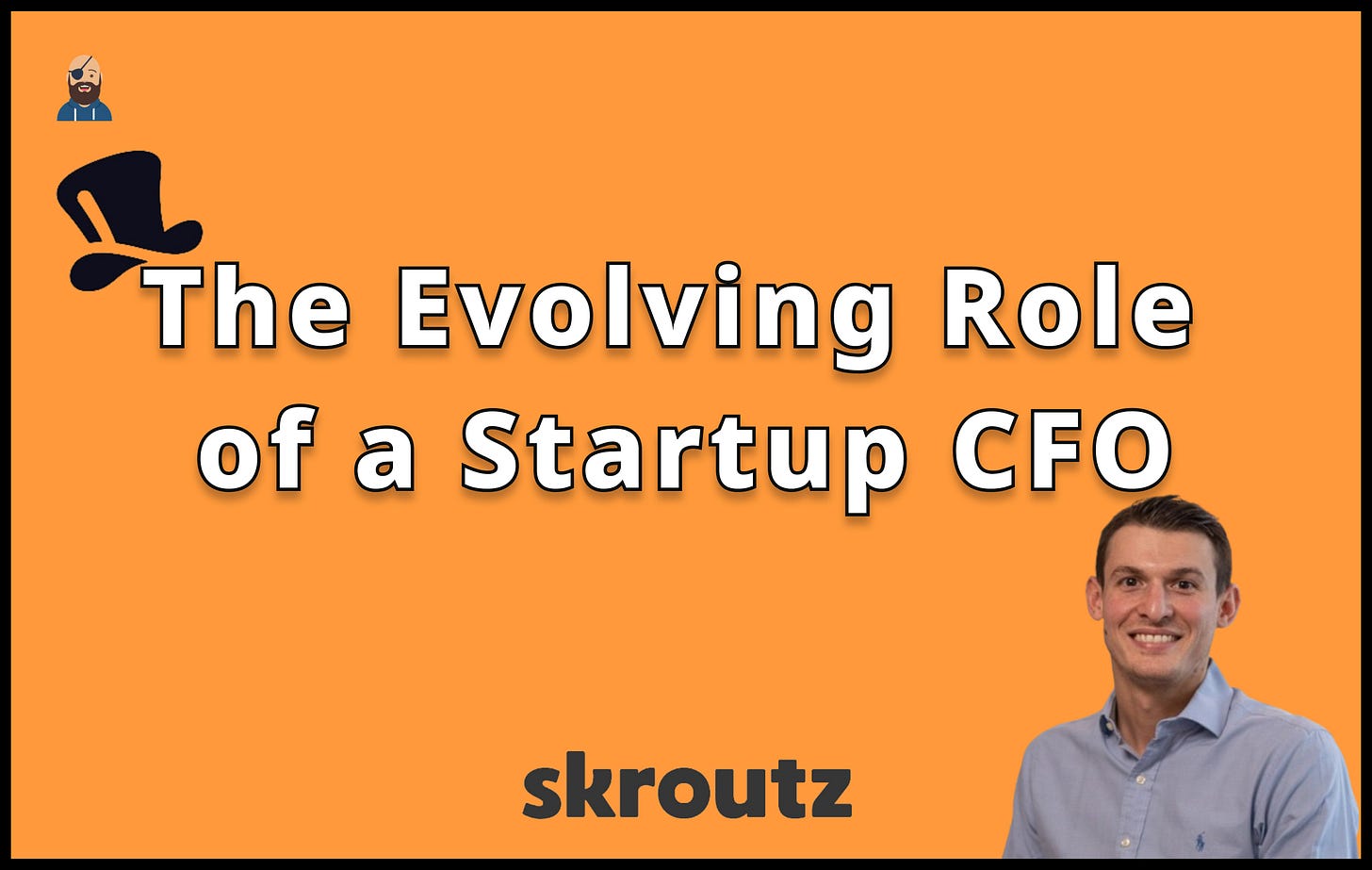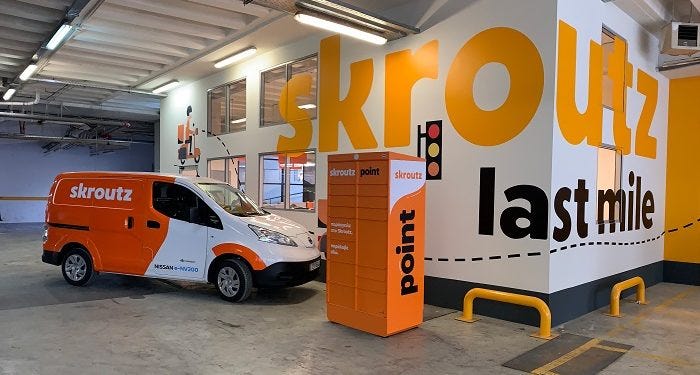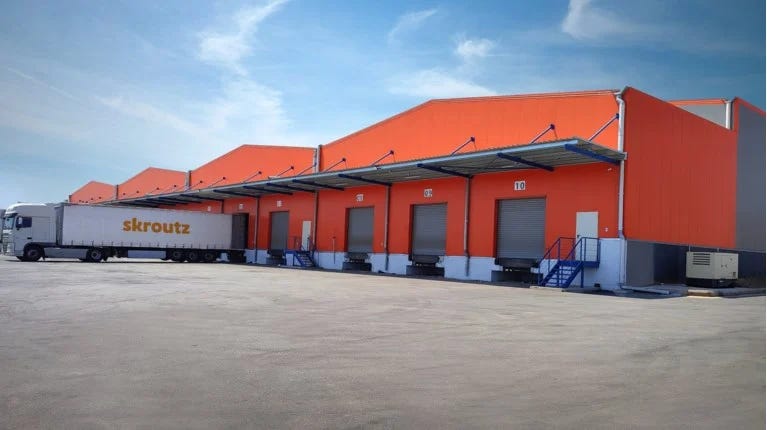The Evolving Role of a Startup CFO
Discussion w/ Kostas Kontogiannis - Skroutz CFO, Blueground becomes a unicorn, Tech Visa, careers in Greece vs. abroad, jobs, events, and more
This is Startup Pirate #97, a writing about technology, entrepreneurship, and startups every two weeks. Made in Greece. If you haven’t subscribed, join 6,070 readers by clicking below:
Here’s what we covered in recent posts:
The Evolving Role of a Startup CFO
The following is a conversation with Kostas Kontogiannis, CFO at Skroutz. Skroutz was founded in 2005, and throughout the years it revolutionised commerce in Greece while it is now the largest marketplace in the country, with more than €100M in revenue last year. With Kostas Kontogiannis, we discussed:
when to hire your first Finance role in a startup
building a Finance team at Skroutz
hiring a CFO and the CFO’s evolving role
the journey of Skroutz from a price comparison site to a marketplace
launching new projects and the role of Finance
Skroutz's new C2C marketplace, country expansion, and much more.
Let's get to it.
Kosta, great to have you here! I'd like to start with a brief introduction and your journey at Skroutz.
KK: I studied economics in my hometown, Volos, a city situated midway on the Greek mainland. Back then, I wanted to become an auditor, so I continued my studies in Thessaloniki for a Master's in Applied Accounting and Auditing and started my career at Mazars. But I quickly realised this was not what I loved doing, so I ended up at the M&A team of PwC. That's where we first crossed paths with Skroutz, as I was involved in the financial due diligence for the deal between Skroutz and CVC, the fund that acquired a stake in the company in 2020.
At that time, Skroutz had a small accounting department operating on top of two spreadsheets — the cash balance on the bank accounts and the revenue per business unit. It made sense, as Skroutz was still a typical price comparison site with no working capital. After the deal with CVC, the board decided to set up a Finance function as the need for reporting became apparent. They asked me to join full-time, which was an offer you couldn't say no to — an A+ team revolutionising commerce in Greece that was about to embark on a new chapter with the support of one of the largest funds in the world. I joined as the Head of FP&A before becoming CFO six months later.
When is the right time to hire the first full-time financial role? What qualifications and traits should you be looking for?
KK: That depends on the complexity of the financial tasks and the company's growth. The time is right when these tasks become too much of an overhead for the founders or the non-Finance person handling them. In the case of Skroutz, we didn't have Finance for about 15 years. There was Accounting which closely monitored all financial aspects — the ins and outs — but didn't have pure reporting and all that stuff. They mainly focused on accounting records, bookkeeping, and tax. This happened primarily due to the characteristics of the business. It was a cash cow generating cash flows without many investors; hence, they didn't have to spend resources on reporting, investor relationships, etc.
A typical problem with startups that delay hiring a Finance person is CEOs or the founders getting distracted too often with reporting or accounting instead of focusing on the company's growth. I'd recommend getting someone on board with experience in finance or economics and at least some basic accounting knowledge. That way, the first hire can handle reporting, FP&A (financial planning and analysis) and accounting while reducing costs since you won't need an external accountant anymore. The ideal candidate should combine an analytical background with strategic thinking and communication skills as every financial decision can speed up or derail growth in a startup.
Excuse my layman's question… You mentioned reporting, FP&A, and accounting. Can you explain the differences in a few words?
KK: A quick view is that reporting focuses on the presentation of financial information (past), FP&A involves financial planning and analysis to support decision-making (short-term future), and accounting encompasses the recording and reporting of financial transactions and compliance with regulations (safeguard).
How did Finance & Accounting at Skroutz grow over the years?
KK: When I joined Skroutz in 2020, the company generated around €20M in revenue. The Finance & Accounting team was composed of one of the founders acting as CFO, who was mainly the person handling costs optimisation and the connection to banks — a very useful skill for a CFO, i.e. access to capital — and ten employees on the Accounting side, including Payroll. Today, we still have ten employees doing accounting and payroll, but there are also three people, including myself, responsible for reporting, FP&A, and monitoring of subsidiaries.
However, I think the biggest investment we made was creating Business Intelligence and Data Warehouse teams, a big part of which sit right next to Finance, so we can leverage data and automations that are key to our decision-making. If you don't have accurate data, you cannot make the right decisions, which is something you are responsible for as Finance. We have also hired analysts working closely with the operations teams.
What does Skroutz's CFO's day-to-day look like?
KK: The role of the CFO has evolved a lot over the years. They are not just the bookkeepers or treasury managers, whose responsibility is mostly to check how money flows and how much cash is left in the accounts. They act as business partners who help decision-making by having a holistic view of operations and adding value to the company. That's why I like to say that "the role is evolving from Chief Finance Officer to Chief Value Officer".
My day-to-day involves many activities on the operation side of the business and planning ahead. I try to convince my team to spend less time looking at what happened thirty days ago and focus on what's happening right now while keeping an eye on the future of the business. There are a lot of metrics we monitor on a daily basis towards that goal.
#1 is growth. This is the most important KPI for Skroutz. #2 is unit economics. We have done a lot of work on that front as we have created P&Ls for users, categories, merchants, etc. #3 is OpEx. Skroutz has grown a lot over the past few years. We hired new employees, increased office space, and outsourced activities in our effort to move fast. Therefore, our operating expenses increased significantly, and we later had to bring that down. There are company-wide metrics, and each business unit has its own dashboard.
When is the right time to consider getting a CFO on board?
KK: For most teams, the complexity of financial activities grows exponentially after Series B, and that's when a decision to hire a CFO becomes more imminent — significant cash flows, investor relations, a solid profit and loss (P&L) statement, evaluating tax structure, etc.
As I said before, the role has evolved a lot in the past decades. I do not advocate blindly hiring decorated CFOs with fancy CVs and long experience. You need to hire someone with the right mentality aligned with company values and the rest of the leadership team.
What’s the role of your team in new ventures at Skroutz?
KK: We aim to involve Finance at the kick-off of every new project — as a business partner, not a disruptor. Our goal is not to make every new project profitable from day 1 but to bring unit economics and P&L into the business case. So, for every new project, we allocate a budget, and along the way, we work side-by-side with the rest of the teams to consider how it can become profitable. I think "growth at all costs" is terrible advice for most organisations, and our goal is to instill a benefit & cost mentality in everything we do.
What were some things that didn’t work as you were expecting?
KK: One example is Skroutz Plus, our membership program that offers free shipping, deals, discounts, and more. When we launched Plus, we knew it would be loss-making in the early days, but our projections were off by a factor of 3. Nobody used to buy cheap stuff on Skroutz, such as pencils, screws, etc. But when the consumer had that option with free shipping, suddenly, consumer behaviour changed. We started having basket sizes of €10, and we were burning money.
We didn't anticipate Plus changing users' purchase behaviour. The team went back to the drawing board to find a better balance between the amazing user and order growth that Plus offered and the unit economics to make it work sustainably in the long run. Skroutz Plus has been a big part of our efforts to transform our company from a price comparison site to a marketplace, and today, Plus users purchase three times more than non-members.
Any other recent bets you'd like to talk about? You recently launched a consumer-to-consumer marketplace.
KK: I think the idea is to become what George Hadjigeorgiou, our CEO, said, "the everyday app". So you can find whatever you want to buy on Skroutz, from groceries to electronics, clothes, books, housewares, and so much more, tied to your loyalty program and with guaranteed delivery.
What about food delivery?
KK: We tried that before, and we quit very early on. So, we are not thinking of tapping that again.
As you said, we recently launched Skoop, our C2C marketplace, which we genuinely believe is a huge opportunity for our business. C2C is big in Europe and still growing, while it is also aligned with our ESG strategy. There's clearly demand and supply for it (we already have 17,000 sellers registered), and a key challenge moving forward would be to ensure the quality of supply. We know buyer protection will be crucial towards that goal, same as B2C where we have already made a large enough investment. It's still early days for Skoop, and we have much to learn.
I also wanted to touch on your delivery business, a vital cog of the transition to a marketplace.
KK: Indeed, another big bet has been Skroutz Last Mile, our delivery business. When you have 8,000 pickup points (merchants' stores) and 2m customers, delivery becomes a huge problem. That's why we also invested in Skroutz Points, a locker infrastructure across Greece, for our customers to pick up orders. We are now building large warehouses to centralise the dispatch of items, too. It makes a tremendous difference in our operations and P&L to move from connecting 8,000 to 2m points vs. a handful of large warehouses to a few thousand pickup points, hence why we incentivise customers to use that network.
We have the building blocks, e.g., fraud prevention, payments, delivery, etc. (a few of them initially set in place through acquisitions such as EveryPay and Sendx), to spin off new ventures with much more confidence than a few years ago. For instance, at Skoop, individual sellers will soon be able to place sold items inside lockers for our couriers to pick up and deliver to the locker designated by the buyer.
Any plans for country expansions?
KK: We already operate in Cyprus, where we continuously increase our gross merchandise value (GMV), and the country now operates with profitable unit economics. It was a relatively straightforward decision for us, given there was no established competitor and no need for site translation. The challenge is logistics since products need to be transferred via airplane or ship, and it's difficult to manage stock within the country. Meanwhile, we aim to tap markets outside Greece primarily by onboarding merchants abroad to sell to the Greek audience. We are certainly thinking about unlocking foreign markets, but I believe we still have a lot of work to do in Greece first.
Thank was really insightful, Kosta. Thank you!
KK: It’s been a pleasure, Alex.
Jobs
Check out job openings here from startups hiring in Greece.
News
Greece minted another unicorn! Blueground reached a $1b valuation 👏 (link)
DeepCure secured $24.6m to develop novel, small molecule therapeutics powered by AI and automation of chemistry. The company has raised more than $72m to date. (link)
DealOps raised Seed led by General Catalyst to restructure sales tooling. (link)
AI recipe formulation platform Proxy Foods raised $2.3m Seed. (link)
Radioisotopic power technology, Direct Kinetic Solutions announced a $1.9m Seed. (link)
Orbito Travel secured €125k to empower travellers with reduced mobility book their trips with confidence. (link)
Greece introducing Tech Visa and Talent Visa, a simplified procedure enabling international talent in tech, academia, and research to settle in the country. (link)
Resources
Dimitrios Kottas, co-founder & CEO of Lambda Automata, discusses the defense landscape in the West and building an AI defense startup. (link)
Careers in Greece vs. abroad and building narratives with Panos Papadopoulos, Partner at Marathon Venture Capital. (link)
A story of bootstrapped exit, generative AI, and modern data stack in the latest Open Coffee Athens. (link)
A report on salaries and HR trends in Greece from Randstad. (link)
Konstantinos Gkovedaros discusses the regulation narrative in Europe vs. the US. (link)
How to use LLMs in Unity by Antonis Makropoulos, founder of UndreamAI. (link)
When meetings are the work with Zaharenia Atzitzikaki, Design Executive & Management Coach. (link)
Thanasis Delistathis, Managing Partner at Proof, on VC capital allocation and launching an opportunity fund. (link)
George Oikonomou, Senior Software Engineering Manager at efood, on career paths in tech and building the tech team at efood. (link)
Events
Open Coffee Thessaloniki #82 on Apr 26
Social Meetup in Athens by Greek Cryptocurrency Community on Apr 27
GenAI on AWS by AWS User Group Athens on Apr 30
HR Scaleup Summit by Startup Pathways on May 16
Start For Future Summit 2024: The Athenian Nexus on May 16
Cosmos Athens by Cosmoverse on May 26
CityJS Athens 2024 on Jun 6-8
That’s all for this week. Tap the heart ❤️ below if you liked this piece — it helps me understand which themes you like best and what I should do more.
Find me on LinkedIn or Twitter.
Until next time,
Alex




